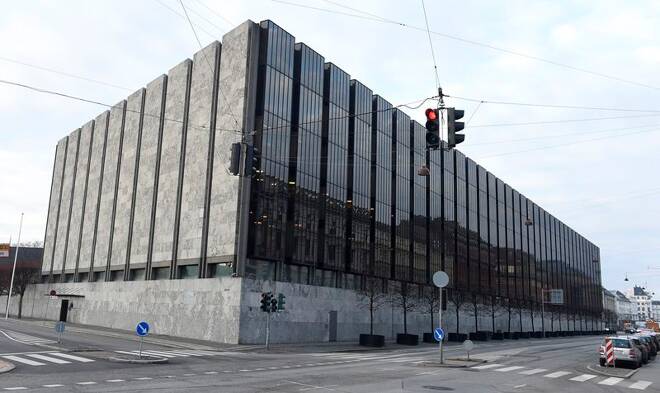Advertisement
Advertisement
Denmark ends nearly decade-long era of negative interest rates
By:
COPENHAGEN (Reuters) - Denmark's central bank raised its key interest rate by 0.75 percentage points to 0.65% on Thursday, following a rate hike earlier in the day by the European Central Bank.
COPENHAGEN (Reuters) -Denmark broke with a nearly decade-long experiment of negative interest rates on Thursday when its central bank lifted its key rate into positive territory, following a similar rate hike by its European counterpart earlier in the day.
The central bank raised its benchmark interest rate by 0.75 percentage point to 0.65%, its second rate hike in two months.
In 2012, Denmark became the first country in the world to impose negative rates, a trend since adopted by other countries to combat both weak inflation rates and changing savings patterns by consumers and businesses.
Earlier on Thursday, the European Central Bank (ECB) raised its benchmark deposit rate again by 75 basis points to 0.75% and signaled further hikes.
Unlike most central banks, the Danish central bank’s sole mandate is to keep the crown currency stable against the euro, an objective it upholds through currency interventions and interest rate moves.
The Danish central bank said in a statement the rate hike was a consequence of the increase by the ECB.
“The interest rate rise is generally desirable for the Danish economy, which continues to balance on the edge of overheating,” Palle Sorensen, chief economist at Nykredit Bank, said in a research note.
The crown’s exchange rate was stable following the announcement from the central bank.
Banks have had a hard time adapting to the negative interest rate environment as they generate less profit on lending. As a countermeasure, most Danish lenders introduced negative interest rates on clients’ large deposits in 2019, a trend that is now reversing.
Denmark’s current account rate, which is the benchmark rate, and the certificate of deposit rate were each raised by 75 basis points to 0.65% from -0.1%. The lending rate was also raised by 75 basis points to 0.8% from 0.05%.
(Reporting by Nikolaj Skydsgaard and Jacob Gronholt-Pedersen; editing by Stine Jacobsen and Jonathan Oatis)
About the Author
Reuterscontributor
Reuters, the news and media division of Thomson Reuters, is the world’s largest international multimedia news provider reaching more than one billion people every day. Reuters provides trusted business, financial, national, and international news to professionals via Thomson Reuters desktops, the world's media organizations, and directly to consumers at Reuters.com and via Reuters TV. Learn more about Thomson Reuters products:
Did you find this article useful?
Latest news and analysis
Advertisement
